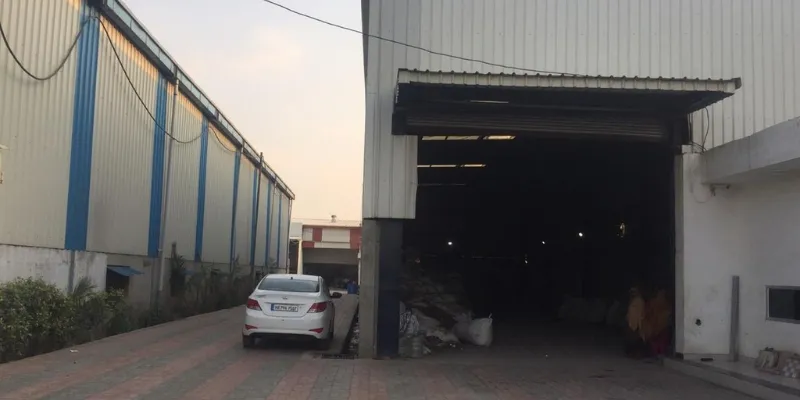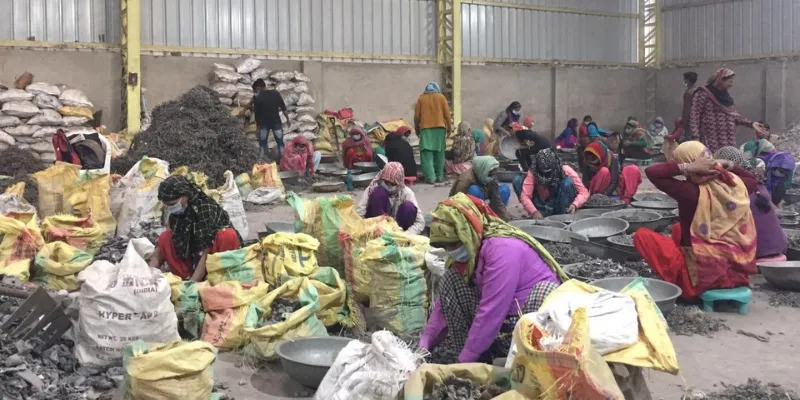How Cosmos Green is working towards a greener environment by recycling metal scrap
Cosmos Green is taking India a step closer to achieving sustainable development by recycling 5,000 metric tonnes of metal scrap every month and creating job opportunities in rural areas.

A huge pile of metal scrap lying at one of the warehouses owned by Cosmos Green.
Recycling is getting a much-needed boost today. While we have all heard about reusing and recycling paper and plastic, most of us don’t know that we can recycle metal as well. Recycling helps in cost reduction, efficient management of limited resources, and reduced landfill.
Metal scrap, once recycled, has been found to be useful across industries like steel, transportation, and automobile. More importantly, it saves energy as well as water, compared to mining metals, ensuring efficient usage of the earth’s resources.
According to a report published by Scrap Register, a global scrap trading platform, India’s annual consumption of metal scrap was a whopping 20.4 million tonnes as of 2015. The country also imported 6.48 million tonnes of metal scrap from countries like the US, UKm and Japan. However, the rate at which the scrap was recycled stood at a meagre 20 percent.
Globally, many organisations are striving to bring about a change in this space by recycling metal scrap of all types.
Cosmos Green, a subsidiary of Cosmos Green Fze, based out of United Arab Emirates (UAE), launched its operations in India in January this year. The organisation was started with an objective to create a cleaner and greener environment in the country. It procures unprocessed metal waste, recycles it to usable ingots, and supplies them to various manufacturing facilities.

A scrapyard located in Faridabad district of Haryana.
Located in the National Capital Region of Faridabad, Cosmos Green recycles metal scraps, and distributes them to packaging, furniture, construction, and steel industries for further production. The organisation claims that it processes nearly 5,000 metric tonnes of metal scrap every month in India.
Research undertaken by Federation of Indian Chambers of Commerce & Industry (FICCI) shows recycling ferrous scrap can reduce the emission of carbon dioxide by 58 percent. Similarly, recycling steel waste results in 76 percent lesser water pollutants and 86 percent fewer air pollutants.
Also read: 60-year-old differently abled man from Gujarat recycles e-waste to build e-bikes
Creating waves of transformation
Speaking about recycling metal scrap, Rajat Kapur, Founder, Cosmos Green, says:
“We got into action keeping in mind that recycling metals like steel, iron, aluminium, and copper can contribute towards reducing pollution levels. Besides, recycling is known to consume 60 percent less energy when compared to refining metals from virgin ores. This automatically ponies up our attempt towards conserving the country’s scarce natural resources.”
Apart from lending a hand to protecting the environment, the organisation is adding value to India’s rural ecosystem and providing job opportunities to people. As the process of segregating, processing, and recycling metal scrap is a very labour-intensive one, Cosmos Green has employed several rural folk in areas such as Faridabad, Palwal, and Karnal districts of Haryana, where its scrapyards are situated.

Rural women sort the metal scrap before sending it for recycling.
“We have employed around 1,000 unskilled and semi-skilled people from rural areas located in and around the scrapyards to sort out 5,000 metric tonnes of scrap. Most of our workforce comprises rural women who are trained with the requisite skills before they get on their jobs. This initiative is backed by the organisation’s aim to scale up rural employment and enhance the quality of life of people residing in rural India,” Rajat tells YourStory.
Cosmos Green has entered into contracts with many manufacturing companies, including Jindal Stainless in Haryana and Jai Bharat Steel in Delhi, for the supply of recycled scrap.
“Rajat Kapur has signed an MoU to recycle metal scrap with us. Together, we want to do our bit to come one step closer to sustainable living,” says Ratan Jindal, Chairman, Jindal Stainless Limited.
How Cosmos Green started

Rajat Kapur, the Founder of Cosmos Green.
Before establishing Cosmos Green, Rajat was into trading of commodities, oil, rubber, spices and precious metals. He says he got the idea to start a unit when he went on a mountaineering expedition to the Swiss Alps.
“During the course of my trip, I realised that I did not have sufficient money to sail through the expedition. In order to make a quick buck, I grabbed an opportunity to work in one of the local scrapyards for a few days. The owner agreed to offer me food, accommodation, and money in exchange for my labour,” Rajat recollects.
As Rajat began work at the scrapyard, he was fascinated with the entire concept of recycling metal scrap and the benefits accrued from it. “That was when I decided to start a metal recycling facility myself down the lane. Since India is a country which has a long way to go when it comes to recycling scrap, I wanted to establish a base here,” he explains.
Also read: How do reusable compostable bags help the environment
Streamlining the supply chain
Cosmos Green procures metal scrap from kabadiwallas, dumping yards, and manufacturing plants in India. However, this accounts for only 20 percent of the total purchase due to inferior quality metal. The rest of it is shipped from abroad at the rate of $1,200 per metric tonne. Later, Cosmos Green conducts inspection at shipping ports to identify and eliminate radioactive or hazardous substances.

Women segregate metal scrap at a scrapyard.
Once it reaches the designated destination in India, the scrap is transported to one of the scrapyards, where the metal is stored and physically segregated. Later, it is taken to the recycling facility where the scrap is shredded and kept in furnaces for further refining. Finally, the purified metal is supplied to many manufacturing facilities across the country.
Rajat says, the entire supply chain is powered by blockchain technology where each and every transaction is recorded in a digital ledger, thereby reducing time lags and eliminating human errors.
Metal scrap recycling in India
The global metal recycling industry amounts to $500 billion, out of which India’s market is estimated to be valued at $11 billion, according to FICCI. This shows that the industry is still at a nascent stage in the country.
“There are certain other companies in the business of recycling metal scrap. However, what sets us apart is the fact that we are working on making our operations highly regulated using a combination of sensor based scrap processing and blockchain technology,” Rajat says.
Talking about the organisation’s future plans, Rajat says, “We are aiming to open many more scrap collection and processing yards across India. Our target is to recycle 1,80,000 metric tonnes of scrap, which is likely to create employment opportunities for 36,000 people by 2024.”
Also read: Is blockchain the answer to tackling the world's pressing waste problem






